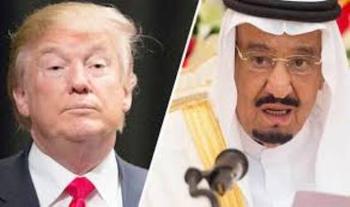Despite links found between al-Qaeda terrorists, who attacked the US soil on September 11, 2001, and some Saudi government officials, the long-classified 28 pages from the congressional inquiry into the Saudi involvement in the terrorist incident remains to be buried in the Capitol with Washington still standing by Riyadh as a major regional ally.
“This is a mechanism of denial, and denial has a price: Preserving the famous strategic alliance with Saudi Arabia at the risk of forgetting that the kingdom also relies on an alliance with a religious clergy that produces, legitimizes, spreads, preaches and defends Wahhabism, the ultra-puritanical form of Islam that Daesh feeds on,” writes Algerian journalist, Kamel Daoud, in an op-ed in The New York Times.
Following thirteen years of military intervention by the United States and its allies in the Middle East to root out terrorism, it seems to be spreading roots and spilling over into other parts of the world from Paris to Orlando.
“Everybody’s worried about stopping terrorism. Well, there’s a really easy way: Stop participating in it,” says Noam Chomsky world-renowned public intellectual and one of the most cited thinkers in human history.
“In its struggle against terrorism, the West wages war on one, but shakes hands with the other,” Daoud says, referring to the double standards in the West’s policy.
Saudi Arabia, apart from backing and funding terrorist groups like al-Qaeda and Daesh, is also responsible for escalating sectarian hostilities in the region.
The Saudi government’s execution of Sheikh Nimr al-Nimr, the well-known Shia cleric and anti-sectarian activist, on 2 January 2016 is a good evidence.
The outspoken Saudi cleric was against the sectarian approaches adopted by Riaydh. He used to insist that Sunnis and Shias are not enemies, and should unite to stand against the sectarian regimes oppressing them.
But now, Iran is among the countries whose citizens are facing a visa ban by the United States.
Iran, as a big powerful nation, is the safest country in the region at a time when terrorism has swept to the Middle East.
President Hassan Rouhani at ceremony on Saturday described the Islamic Republic as a country of peace and friendship.
“Iran is a country that has always helped promote regional and global peace and stability,” President Rouhani said.
Iran, on the other hand, has suffered dire consequences of tides of terrorism and conflicts mainly created as a result of foreign interventions in the region.
“Iran as a nation in the region has felt deep inside the consequences of extremism, aggression and terrorism,” President Rouhani said.
Yet, Iran is a country vowing to counter terrorism everywhere.
“We stand by all the freedom-seeking nations that want to fight terrorism everywhere across the world,” Rouhani said.
Above all, a close look at the history of the cradle of civilization, Iran, reveals that the country has no precedent in modern history attacking another land.
Iran has not launched an aggressive war in modern history (unlike the US or the Zionist regime), and its leaders have a doctrine of “no first strike,” says University of Michigan professor and polemicist, Juan Cole.
What the US president, Donald Trump, is doing, allegedly to stop terrorists from entering the US, is going to amount to a historic shame by a country that claims to be the flag-bearer of democracy and human rights.
It is a “historic shame,” Hossein Mousavian former nuclear negotiator for Iran and the research scholar and lecturer at Princeton University, wrote in a recent Tweet.
According to Mousavian “none of 9/11 perpetrators on list” were from Iran.
“Iranians with 1000s of years of civilization have never attacked US soil.”
 Mouood Mouood English Edition
Mouood Mouood English Edition




